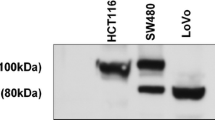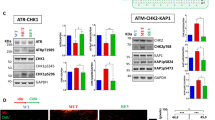Abstract
Purpose. Alterations in the DNA mismatch repair (MMR) proteins have been associated with an increased resistance of many cancer cell lines to cisplatin. The aim of this work was to investigate whether defects in DNA MMR proteins are involved in the survival of human colorectal cancer cells in the presence of high concentrations of cisplatin and oxaliplatin, a diaminocyclohexane (DACH) platinum compound whose adducts are not recognized by the MMR system.
Methods. Six unselected human colon cancer cell lines (HT29, HCT15, HCT116, Caco2, SW480 and SW620) were treated with a single 3-h exposure to cisplatin or oxaliplatin at suprapharmacological concentrations, ranging from 50 to 200 µg/ml. The microsatellite stability and the expression of MMR proteins in the parental cell lines and in the drug-selected subpopulations were studied.
Results. Most cells underwent apoptosis in the days following the cisplatin or oxaliplatin treatment, but some colonies expanded 3 to 4 weeks after, suggesting the presence of innately resistant cells in the six parental cell lines. Microsatellite instability (MIN), which reflects genetic defects in the DNA MMR system, was detected only in the HCT116 parental cell line and its drug-selected counterparts, due to a known mutation in the hMLH1 gene. No acquired MIN was observed in the other cisplatin-selected sublines derived from the HT29, HCT15, Caco2, SW480 or SW620 parental cells. In the same way, Western blot analysis showed that expression of the DNA MMR proteins hMLH1, hPMS1, hPMS2, hMSH2 and hMSH6 did not differ between the parental and the drug-surviving cells.
Conclusions. These results indicate that high-level resistance of human colon cancer cells to high doses of cisplatin and oxaliplatin does not seem to be related to acquired defects in the DNA MMR proteins.
Similar content being viewed by others
Author information
Authors and Affiliations
Additional information
Electronic Publication
Rights and permissions
About this article
Cite this article
Sergent, C., Franco, N., Chapusot, C. et al. Human colon cancer cells surviving high doses of cisplatin or oxaliplatin in vitro are not defective in DNA mismatch repair proteins. Cancer Chemother Pharmacol 49, 445–452 (2002). https://doi.org/10.1007/s00280-002-0450-6
Received:
Accepted:
Issue Date:
DOI: https://doi.org/10.1007/s00280-002-0450-6




